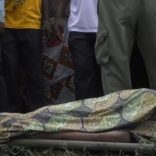Mozambique: Beira sees 10 femicides in five months - O País
Mozambique: Almost 100,000 displaced in Cabo Delgado in less than a month – IOM

File photo: Lusa
The new wave of terrorist attacks in Cabo Delgado, in northern Mozambique, has displaced 99,313 people in less than a month, according to an estimate released yesterday by the International Organization for Migration (IOM).
“Between 22 December 2023 to 03 March 2024, sporadic attacks and fear of attacks by non-state armed groups in Ibo, Macomia, Chiure, Mecufi, Mocimboa da Praia and Muidumbe triggered the cumulative displacement 112,894 individuals (24,241 families). The current Movement Alert 103 reports on recent attacks recorded in Chiure, Macomia, and Mecufi between 08 February to 03 March, which displaced 99,313 individuals,” the IOM Movement Alert report details.
At issue, according to a weekly bulletin from the intergovernmental agency, to which Lusa had access, is the displacement of people caused by the attacks that occurred between February 8th and March 3rd, especially in the districts of Chiùre and Macomia, respectively with 91,239 and 5,719 displaced during that period, mostly children (62%/61,492).
“The attacks and the fear of attacks by armed groups” occurred mainly in Ocua, Mazeze and Chiùre-Velho, in the district of Chiùre, with the displaced people fleeing to the town of Chiùre (28,754) or to Erati, in neighbouring Nampula province (45,957).
The IOM counts 20,668 families displaced, by boat, bus or on foot in less than one month, in the south of the province of Cabo Delgado.
In the same bulletin, the IOM states that, between December 22, 2023, and March 3, 2024, “sporadic attacks and fear of attacks by armed groups” in Macomia, Chiure, Mecufi, Mocímboa da Praia and Muidumbe led to the flight of 24,241 families, totalling 112,894 individuals.
At the end of February, the Islamic State (IS) terrorist group claimed responsibility for 27 attacks in the same month, in “Christian” villages in Chiùre district, Cabo Delgado, in which it claims 70 people died.
Through the group’s propaganda channels, which documents these attacks with photographs, the destruction of 500 churches, houses and public buildings in that southern district of Cabo Delgado province is also claimed, according to statements to which Lusa has had access.
This new wave of attacks towards the south of Cabo Delgado has been growing since December after a period of several months of relative calm, and has forced thousands of people to abandon their villages, mainly in Chiùre, but the Mozambican authorities claim that there are now improvements, with the number of displaced people falling from the official 67,000 to 45,000, as stated on Monday by Prime Minister of Mozambique, Adriano Maleiane.
The Mozambican police told Lusa a week ago that they were “filtering” the movement of displaced people caused by the new wave of terrorist attacks for possible insurgents.
“We are working with the communities, taking into account that we have to filter to be able to establish whether in this group of returnees in the Chiùre district there are infiltrators who may be associated with terrorism,” Chiure police spokesperson Aniceto Magome said.
The UN High Commissioner for Refugees said in Maputo on Monday that Mozambique needs to find “the best solutions” for people forced to flee armed attacks in Cabo Delgado and natural calamities, promising support.
“The most important thing is how to help the government find solutions for displaced people, whether helping them return to their homes or transferring them to other places or [remaining] where they are,” UN High Commissioner for Refugees, Filippo Grandi, said to journalists after a meeting with President Filipe Nyusi in Maputo.
“We agree on the next steps, and how the United Nations can best assist the central government and local authorities to respond to this situation by providing humanitarian assistance in the short term,” he said.
Grandi, who plans to visit Cabo Delgado this week, said that assistance to support the return of those displaced to their areas of origin or definitive resettlement in new areas was envisaged.












Leave a Reply
Be the First to Comment!
You must be logged in to post a comment.
You must be logged in to post a comment.